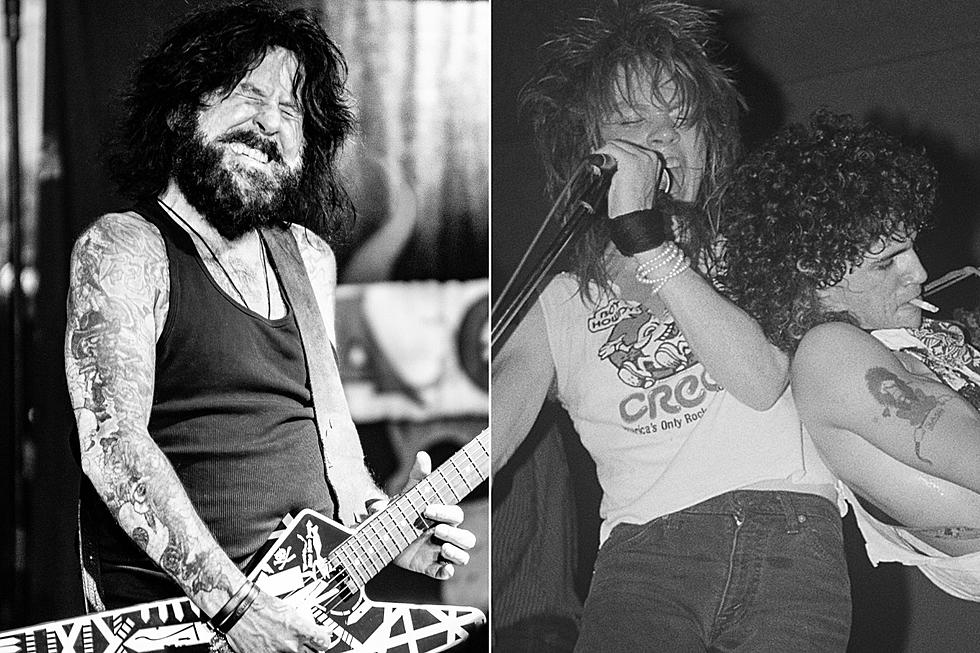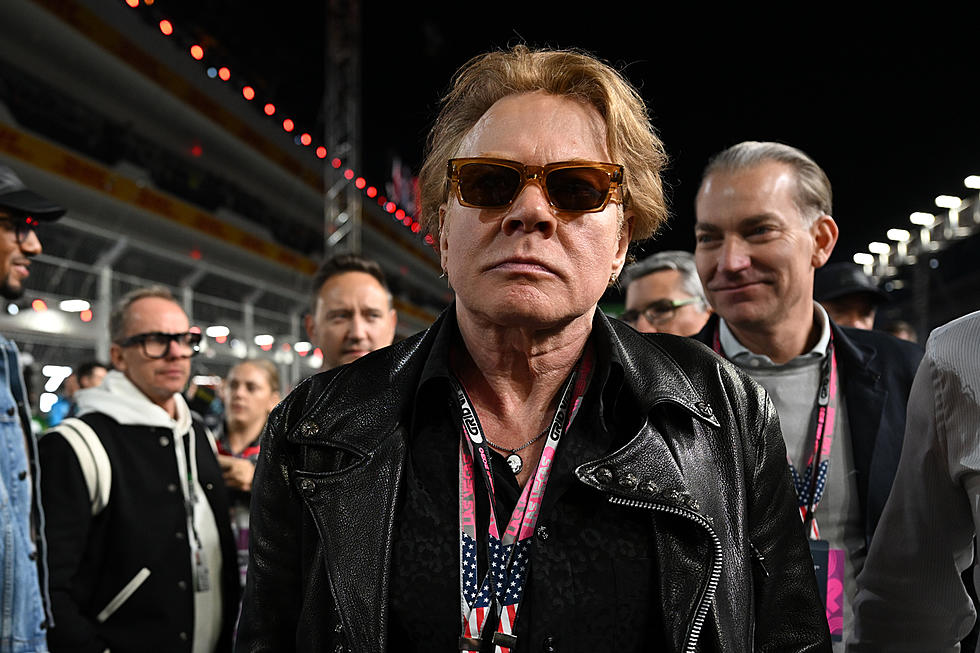
Tracii Guns Proud of Role in ‘World-Changing’ Guns N’ Roses Debut
Before he forged his own path as leader of L.A. Guns, guitarist Tracii Guns lent his talents — and his surname — to a pre-fame Guns N' Roses.
Guns soon left to reform L.A. Guns, and was replaced by Slash. GNR's 1985 lineup also included Hollywood Rose members Axl Rose and Izzy Stradlin. Duff McKagan and Steven Adler fleshed out the classic-era lineup that same year. Appetite for Destruction followed on July 21, 1987, less than six months before L.A. Guns' self-titled debut.
Guns shared his memories of hearing the "world-changing" Appetite for the first time, as L.A. Guns prepared to release their new studio album Checkered Past. He also discussed how the LP influenced his work with L.A. Guns, and his pride in having played a role in one of the biggest rock bands of all time.
You guys were certainly part of the Sunset Strip scene, but by the time your first record came out in '88, the whole thing was definitely starting to get a little contrived, for lack of a better term. Did you guys feel like you were out of step with the the trends at the time?
When our first record came out, I think I was 21. I thought I was setting the trends. When you're that young — and that's why you do it when you're young — in my case, especially in Guns N' Roses, we had so many conversations about what we should do or what we shouldn't do, that a few months later when reforming L.A. Guns, I had the same thought process of like: "Don't do that. Do what you want to do. Don't do that. Don't be Motley Crue, don't be W.A.S.P.," even though those were my favorite bands at the time. So, it was like balancing the musician that you are and then also wanting to achieve a recording contract – because it's more about the recording contract than the fans at that point. The recording contract gives you the platform. Other people will tell you that getting the recording contract is the sense of life or death, because that's where it begins.
So yeah, we were selling out clubs in L.A., but had we made a tragic record, well, that would have been the end of that. So, all that hard work in the clubs — and it wasn't hard work, it was fun — doing that is for nothing. It's like people that reinvent themselves, thinking they're gonna gain more success every year and a half. They don't realize they're starting from zero, trying to attract people. So the idea was to get enough recognition locally to get a record contract, and then taking the record contract seriously once we got it. And then the conversation was defining a sound. Like, hey, what do we sound like? Who do we sound like? What are our influences? How do we make sure that we take our collective influences and make our own sound? If nothing else, the first L.A. Guns record definitely did that. You can't compare that record to anything else. It just doesn't have obvious influences.
I'm curious what your impression of Appetite for Destruction was when it came out, and if it had any impact on you as you were writing songs for the first L.A. Guns record.
It was such an amazing [album], and I remember everything about it. We were actually recording our first record before it came out. I got an advance cassette. L.A. Guns was in the Village Recorder, recording our first album. Guns N' Roses had just finished the record. So I don't remember who, somebody sent me the cassette over to the studio. I was like, "Wow, okay. What's this gonna be?" So I went into Studio A, which is kind of a vocal room, and popped it in and listened to it by myself. The standout was "It's So Easy." It was like, "Whoa, where did this come from?" Like, holy ... The double voice, the high voice and low voice, first thing I noticed. Like, wow. It was what I expected and more, because I knew how great the band was. So I got really excited, and I ran into in the big room where we were. I said, "Guys, I got the new Guns N' Roses record! Let's go listen. It's amazing." And everybody's reaction in the band was, "Yeah, it's alright." And one of the guys said, "Yeah, you're just excited about it because you still think it's your band." It's like, how could you say that to me? Whatever.
Anyways, [I] thought it was amazing. Me and my tech couldn't wait to leave the studio to go home to listen to the record at home. And we listened to that record just like any other fan would. We really bought into it. And at the end of the day, the greatest thing about the album is it's a real lifestyle album. The lyrics tell stories that are based on reality, turned into maybe a little bit more fantasy, but they're all rooted in some truth somewhere. And the lyrics and the attitude for the time were truly refreshing, coming off of – hard metal was really the focus. You know, Motley Crue's Shout at the Devil — we didn't pay attention to Theatre of Pain, but Shout at the Devil we did. And other bands like that: W.A.S.P., obviously. Ratt was a little slick for what we wanted to do and what Guns N' Roses certainly wanted to do. So it was all about the conversations that I'd had, still putting Guns N' Roses together, like: "How do we blend Hanoi Rocks and Aerosmith with Accept?" Those were the parameters. So that kind of left out [Black] Sabbath, left out Van Halen, left out Scorpions. So blues-based, but hard. How do you do that? And also, the L.A. punk element. Not the British punk element, but definitely the L.A. attitude, the punk street attitude.
So, for me, it was an immediate success, because it achieved the lifestyle. It achieved the story of what was going on, and that's why it holds true to this day. Use Your Illusion and that stuff, it's good, and there's some really good songs on those records. But the reason why Appetite for Destruction still has a band selling out stadiums today is because it was such a big changer. It was such a reality check. People singing about things that were so ridiculous, and Axl coming out singing, "Bend over bitch; I got a use for you." It set up hardcore rap, didn't it? This was reality in 1986, '87. The record had a huge impact on me. I loved it. I'm still proud of it, even though I didn't play one note on it. I really know how special it is.
It's funny that your bandmates said you were just excited because you thought it was your band. I feel like if that were true, you would have actually tried to dismiss it.
That's the fight-or-flight response. The flight would be, "Yeah, whatever." But I just always held the band dear. And that has always been my attitude towards Guns N' Roses. I left the band for uncomfortable reasons, and it had nothing to do with the music. It had nothing to do with me not respecting the musicality and the direction and the idea of the band. So to see it come to life — because, you know, going back to setting trends, that was the idea: "Let's be honest. Let's be real. Let's be great." It was and it still is to this day.
Did you ever allow yourself to play the game of "What if?" What if you had played on that record? What if things had gone differently?
How could I not? I'm a human being. And the truth is that it takes so many elements for an earth-changing, world-changing, society-changing event, that I feel if you change any one of those elements, it won't impact the same way — including my glorious, wonderful personality and guitar playing. It wouldn't have been the same. There's a chemistry that Slash has in that band. Those five guys, man, on that first record – you just look at the cross and look at the characters of those guys. That's Guns N' Roses. And Steven Adler's drumming on that record, it says everything about the direction that band was going. But the "what if" is like, had I not had this really stupid view of the world — of "I'm gonna make it because I'm this guy" — and let's say I was proven wrong. Let's say I didn't have success, or I wasn't able to create music for the next 30 years or however long it's been, and keep myself alive and play live and make recordings. Then I might have a very different opinion. I might be like, "Oh, yeah, those guys, blah blah blah." And there's a big honor in having my name in the name of that band. It's arguably the biggest rock 'n' roll band of all time, and the first word is "Guns." That's my last name. How can I be mad at that?
Watch UCR's Complete Interview With Tracii Guns
Top 30 Glam Metal Albums
Guns N’ Roses’ Most Underrated Songs
More From Ultimate Classic Rock









